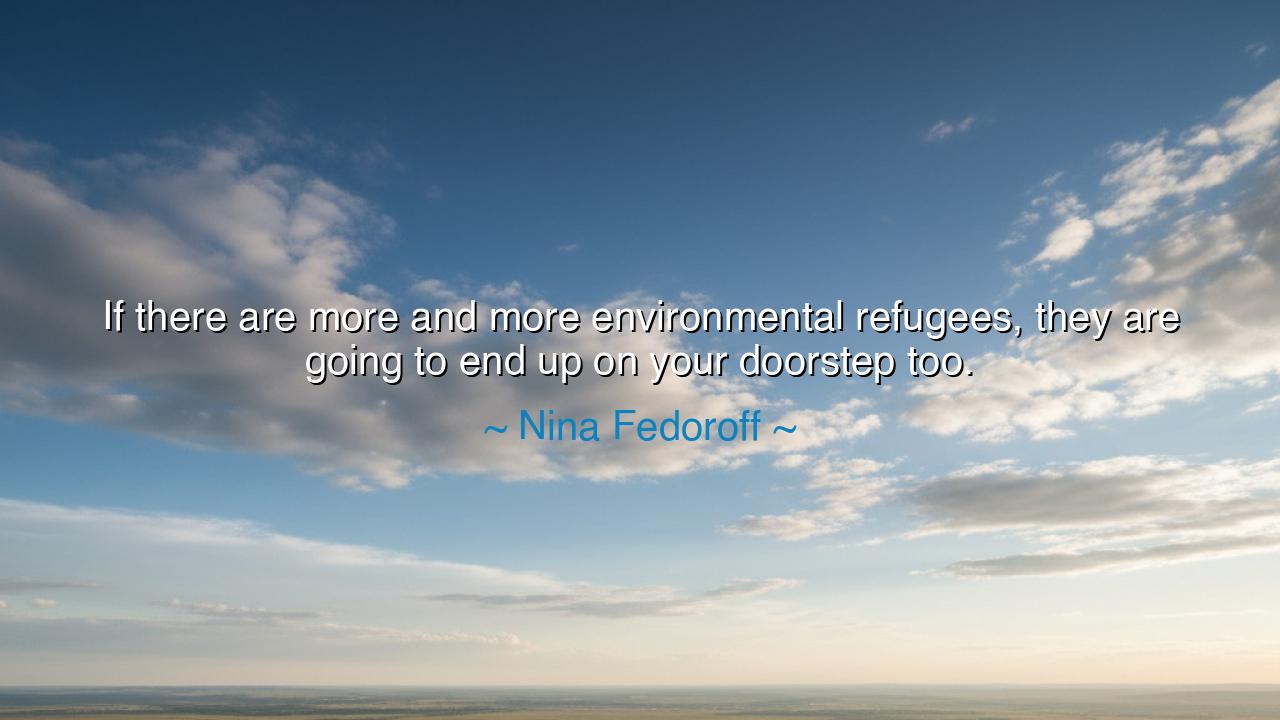
If there are more and more environmental refugees, they are going
If there are more and more environmental refugees, they are going to end up on your doorstep too.






Hear the urgent cry of Nina Fedoroff, a scholar who has long spoken of science and survival: “If there are more and more environmental refugees, they are going to end up on your doorstep too.” This is not a prophecy meant to frighten, but a sober reminder that no nation, no household, no fortress of wealth is immune from the upheavals of the earth. For the refugees of famine, of flood, of fire and drought are not strangers from a faraway tale; they are men, women, and children like ourselves, driven from their homes when the land can no longer bear them. And when their numbers swell, they will cross borders, seeking not conquest, but life.
The meaning of this saying is that the crisis of the earth cannot be contained. Some imagine that when rivers dry in Africa, or islands sink in the Pacific, it is only the sorrow of distant peoples. Yet Fedoroff warns that their sorrow will spill over, reaching the very thresholds of those who thought themselves secure. The movement of peoples is the movement of history itself, and when environmental collapse drives millions from their homelands, the ripples will strike every shore. Thus, what befalls one nation cannot be ignored by another; the suffering of the earth is a shared inheritance.
History has shown this truth again and again. Recall the Dust Bowl of the 1930s, when waves of American farmers fled the parched plains of Oklahoma and Kansas. The soil had turned to dust, the crops withered, and their fields yielded no more bread. They became refugees in their own land, streaming westward toward California, where they were met not with welcome, but with suspicion, hostility, and hardship. The plight of these “Okies” revealed how swiftly environmental ruin can uproot entire communities, transforming neighbors into wanderers. If this was so in one region of one nation, how much greater will the upheaval be when climate change stirs millions across the globe?
Fedoroff’s words also carry a hidden warning against indifference. For it is easy to dismiss the plight of refugees as “their problem.” Yet the tide of human need is relentless. When people can no longer live upon their land, they will seek new land; when seas rise, they will move inland; when crops fail, they will move toward those who still have bread. And if the prosperous do not act with foresight—mitigating climate change, aiding vulnerable nations, preparing for migrations—then their own doorsteps will become the frontlines of chaos.
But her saying is not merely a warning; it is also a call to compassion and responsibility. For when the displaced arrive, the test of nations will not only be in how they protect their borders, but in how they preserve their humanity. To recognize in the refugee a mirror of oneself is to see that their survival and ours are bound together. The ancient law of hospitality, once sacred among tribes and kingdoms, may again become the mark of civilization. For in their faces, we see not only their suffering, but our possible future.
The lesson is this: protect the earth now, so that fewer are forced to flee; prepare for migrations with wisdom, so that chaos does not overwhelm; and above all, remember that justice demands mercy. Support leaders who face climate truth with courage. Aid communities that are most vulnerable to rising seas, failing crops, and spreading deserts. And in your own life, live in a way that lessens the strain upon the earth, so that your choices do not add to the burdens of others.
Practical action lies before us all: conserve energy, reduce waste, support policies that cut emissions, and lend your strength to organizations that aid those already displaced by climate disaster. For the tide of refugees is not a distant threat, but a living reality. Every act of preparation, every deed of compassion, builds a bridge for the future.
So let Nina Fedoroff’s words echo in your soul: “They will end up on your doorstep too.” Do not wait until that day arrives in fear or resentment. Act now, with foresight and with heart, so that when the refugees come—as they surely will—the world may be ready to receive them not as burdens, but as fellow travelers in humanity’s long journey upon this fragile earth.






AAdministratorAdministrator
Welcome, honored guests. Please leave a comment, we will respond soon